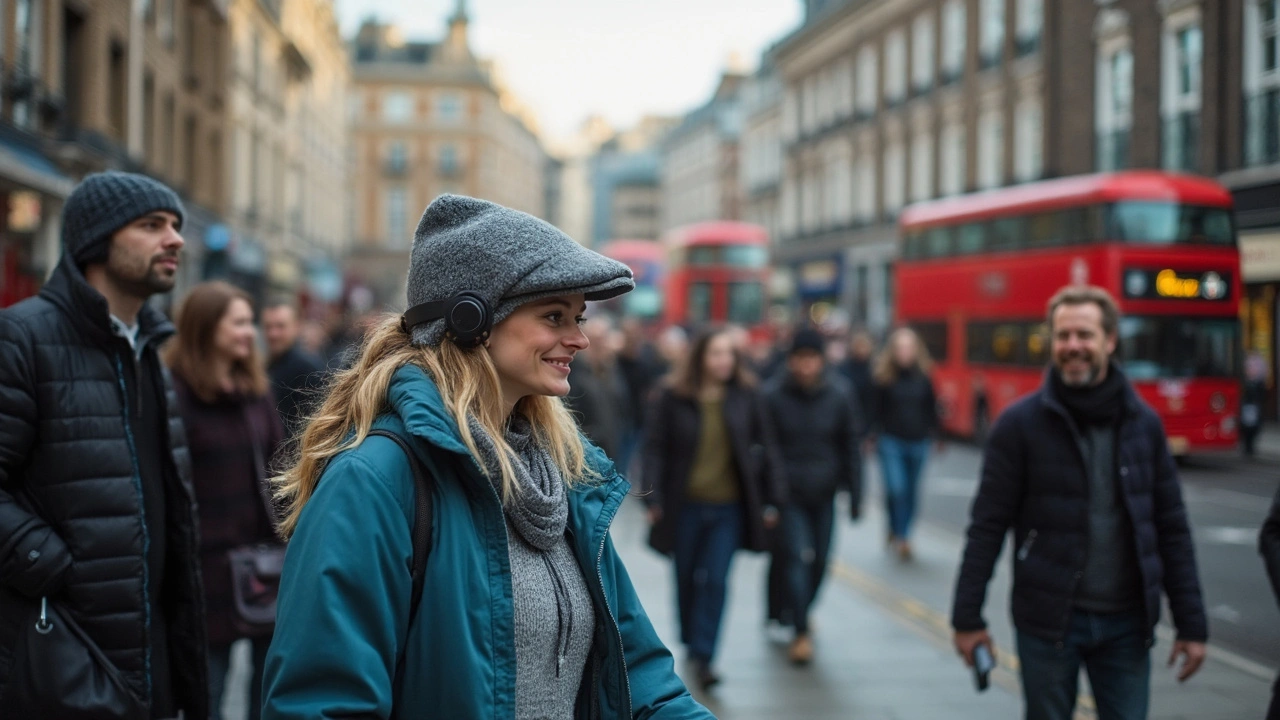
Tech in London can feel a bit like the Tube at rush hour—crammed, chaotic, and maybe a little overwhelming if you’re not paying attention. Everybody talks about the glitzy launches from giant brands at Old Street’s Silicon Roundabout. But getting swept up in the buzz means lots of fascinating breakthroughs slip right under the radar. Believe it or not, some of the most useful—and quietly life-changing—innovations aren’t being chased by Silicon Valley VC money or making headlines in the Metro. Instead, they’re growing in a patchwork of micro-labs, indie co-working spaces, and even at the kitchen tables of brilliant Londoners. If you’ve found yourself wondering why your local Pret always finds the right temperature for an oat latte, or how the Barbican suddenly became more accessible, the answer might be one of these hidden technology gems.
Step off at King’s Cross and chances are you’ll walk right past an entire ecosystem of small-scale tech that rarely gets a mention. For example, in Camden, a team quietly launched an AI-driven public transport assistant that uses natural language voice prompts, making it easier for visually-impaired Londoners to get live bus updates. While everyone clamoured for the launch of London’s e-bikes, a tiny startup in Hackney quietly designed sensors that let cycle lanes detect pollution and alert local councils in real-time. It sounds almost sci-fi, but in 2024, over one-third of on-street air quality reports in Islington came from these under-the-radar detectors, not from government investment.
It’s not just public amenities becoming smarter. Look at simple innovations changing day-to-day life: In Southwark’s bustling Borough Market, several traders use inexpensive Internet-of-Things (IoT) scales that update their stall’s online stock automatically—no more running out of cheddar mid-rush, and locals can check what’s available before they trek down. It’s the kind of thing that sounds boring on paper, until you dodge the disappointment of an empty cheese counter. These small inventions stick because they solve real, local problems, and they do it without fuss or fanfare.
Take the leap to energy savings, and you’ll run into teams like the folks at a tiny studio near Brick Lane, who worked on smart LED lighting systems that adjust brightness in Shoreditch cafés based on natural daylight. Their system, used by less than a dozen independent coffee shops, cut energy bills by almost 30% during last winter’s cold snap. The tech may never win awards, but it proves London’s local businesses can thrive quietly, all thanks to some ingenious coding and a bit of London weather savvy.
Want numbers? Here’s a table showing just how much impact some quietly adopted London tech has brought to daily life:
| Innovation | Estimated London Users (2024) | Impact |
|---|---|---|
| AI Transit Voice Assistant (Camden) | 2,500+ | Increased accessible bus travel by 18% |
| IoT Cycle Lane Sensors (Hackney) | 1,100 devices | 30% faster response to air pollution alerts |
| Smart Market Scales (Borough) | 30 traders | Reduced food waste by 22% in pilot phase |
| Adaptive Café Lighting (Brick Lane, Shoreditch) | 12 cafés | 30%+ drop in winter energy bills |
It’s rarely the flashiest solutions making the biggest difference. From AI tools simplifying navigation around the London Eye for blind visitors, to affordable smart bins in Hackney that send fill-level alerts to waste collectors, innovation isn’t hanging out at glitzy tech expos; it’s out on the city streets or in tiny offices above noisy pubs.
If you ask folks in Soho about the big names in tech, everyone mentions the obvious: fintech giants, big streaming services, or smartphone apps funded with millions. But right under their noses are solo entrepreneurs and mini-teams turning out new products that quietly change things. Let’s talk about one of my favourites—a Peckham-based startup with a charmingly geeky name, “ToastTech.” Instead of building another ride-sharing app, they designed kitchen sensors that track air humidity and let bakeries like those in Notting Hill whip up sourdough without mystery flops, even during London’s unpredictable weather swings. There’s something brilliantly local about a device helping your Saturday market loaf stay fresh while also combatting food waste, a growing problem across UK cities.
Accessibility-focused gadgets have also bloomed in the last year, though many Londoners haven’t noticed. In April, a social enterprise near Stratford piloted “Tactile Tube,” a network of bump-mapped handrails with sensors for the Elizabeth line, helping commuters with low vision reach their platforms faster. There’s even a grassroots project worked on by a retired engineer in Finsbury Park, making low-cost vibrating markers for the city’s cycling superhighways, so riders can stay in lanes without always watching the road. An impressive 15% drop in cycling accidents happened on one trial route—that’s dozens of scraped knees and dented bikes avoided each month.
When it comes to sustainability, South London’s innovation pockets are a secret worth sharing. A cluster of engineers in Brixton operates a rooftop “repair lab,” using 3D printers to create bespoke parts for things like the Thameslink’s old signal boxes and out-of-warranty kitchen appliances at local community centres. Instead of buying new, Londoners save hundreds—and the city quietly trims down on electronic waste, which hit 195,000 tonnes UK-wide in 2024. If you’re the hands-on type, some of these repair collectives run free Saturday drop-in sessions. You’ll meet the real tinkerers making London greener, one fixed toaster or escalator screw at a time.
And for the foodies: Don’t skip Walthamstow’s pop-up market, where an enterprising duo invented a Bluetooth-powered temperature tracker designed for the back rooms of fishmongers and cheesemongers. The tech is dead simple but a total game-changer – it sounds a quick warning if cold storage rises just a notch above safe limits, preventing thousands of pounds in spoiled food each season for family-run shops. Everyone loves the latest five-star reviewed delivery app, but sometimes true genius hides in the corners of a covered market, keeping your favourite Cornish brie or kipper fresh another day.

Peek around your local café, an independent bookshop, or even the nearest yoga studio in Camden, and you’ll spot quiet examples of tech blending right into daily life. How many of us have noticed the QR-coded bike racks dotting Marylebone that let you pay for quick storage with Apple Pay, or the recycled phone kiosks in Greenwich offering superfast public charging? The thing is, so much ease rides on very local, almost invisible tech. In 2024, the Royal Parks Authority rolled out weather-proof Wi-Fi hotspots across Hyde Park—one quick scan on your phone opens a network that’s safe, fast, and even blocks most phishing attempts. No press releases, no drama—just a better way to stream your picnic playlist or join a UK-wide Teams call on your lunch break.
For those working remotely (and let’s face it, that’s a decent chunk of London these days), Shoreditch’s smaller co-working spaces jumped ahead with digital booking boards that remember your coffee order and automatically reserve your favourite window desk. It’s not a big splashy disruptor, but it’s the difference between loving a workspace and dreading a Monday. Same goes for small changes like the e-ink event boards at the British Library. They look a bit basic, but with battery life measured in months, they replaced paper event flyers and cut library printing costs by 40%.
If you’ve ever zipped into a pharmacy on Oxford Street for a gleaming smile, you might owe thanks to a local invention. Some high street chains use AI facial scanners (strictly opt-in, don’t worry!) to scan for signs of tooth or gum trouble, with private results and a carefully-vetted route to a local dental hygienist or full-on dentist in London, sometimes even same day. It’s speedy and surprisingly accurate, saving time for folks juggling work, kids, and city commutes. Tucked away behind the screens, more London pharmacies now use little-known NHS-approved smart pill dispensers to remind patients to pick up critical medication, firing off an SMS nudge at the perfect time—fewer late-night dashes or missed appointments for Londoners living busy lives.
Where public safety is concerned, Lambeth’s council has been quietly testing a crowd analytics tool at Saturday markets. It’s not about tracking people, but monitoring flow and density so organizers know exactly when to let in more visitors and when to thin crowds out, avoiding stampedes or bottlenecks. It’s done its job so well, other major boroughs are planning to borrow the code. That’s tech that doesn’t just blend in, but actively keeps things running smoother, safer, and with less fuss for everyone.
So, how do you as a regular Londoner, or maybe a savvy expat or business pro, spot these hidden gems before they get snatched by some global giant or disappear into corporate black holes? Key tip: start local. Track what’s changing in your borough, not just on Twitter trends. Follow neighbourhood hackathons and micro-events—like the ones regularly hosted at Somerset House or the low-key tech nights at the Good Hotel in the Docklands—where you can meet inventors plugging genuinely new devices. The true treasures usually show up first where you shop, cycle, or drink in the city. If you see a café using an odd, sleek gadget, ask about it. Most founders love chatting to curious customers and explaining their brainchild.
Support matters. Even if you aren’t ready to invest, simply spreading the word on WhatsApp or local Facebook groups is huge. London’s artist studios and repair cafés often run crowdfunder campaigns—participating can mean earlier access to their tech, sometimes at a fraction of the usual price. Many community science festivals—like the Greenwich Science Festival or the Bloomsbury Festival—feature demo zones where you can get hands-on, provide feedback, and feel more like a true London innovator yourself. If you ever thought, “Why doesn’t someone invent…?” in line at Tesco, odds are, someone has. You just need to wander a little more off the beaten path and look for it.
When it comes to business professionals and those wanting that competitive edge (or at least a cool story for your next meeting), volunteering as a mentor or advisor with accelerators such as Bethnal Green Ventures can put you on the inside track. These programs often rely on Londoners with everyday smarts and diverse backgrounds—not just big-time investors or “techies.” A recent BGV report showed that local volunteers helped 60% of their startups land their first real-world test in 2024, sometimes before even raising traditional funding. The impact? New tech truly designed by and for London, not just parachuted in from abroad.
Finally, if you’re keen on actually experimenting with these innovations, keep an eye on pop-ups hosted by Digital Catapult at their Euston hub or events running as part of London Tech Week. You’ll spot prototypes that will make you squint and say, “Wait, that’s possible?” Often, these aren’t ready for the shelves—but that’s the thrill. Getting in early, offering the kind of no-nonsense feedback Londoners are celebrated for, can help shape solutions that stick, not just flash then vanish.
Hidden technology in London isn’t just a fun trivia topic—it’s reshaping everything from your quickest morning commute to how local shops fight food waste. Miss what’s hiding in the city’s side streets, and you miss the heartbeat of what’s really making London move. Next time you spot something new at your favourite market, café, or gallery, don’t just scroll past—there’s a good chance you’re looking at London’s next *big* little thing.